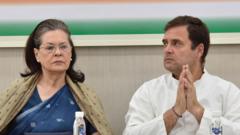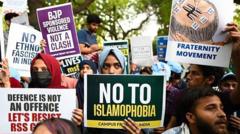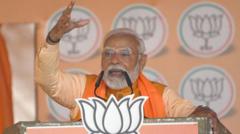The tragic death of a 10-year-old girl in Bihar, following an alleged delay in her medical treatment, has ignited public outrage and raised serious questions regarding healthcare access and government accountability in India.
Outrage in India After Delay in Medical Treatment for 10-Year-Old Rape Victim Leads to Death

Outrage in India After Delay in Medical Treatment for 10-Year-Old Rape Victim Leads to Death
Anger erupts across India as a 10-year-old rape victim dies allegedly due to delayed medical intervention in Bihar.
The girl succumbed to her injuries on Sunday at the Patna Medical College and Hospital (PMCH) after being raped on May 26, allegedly by a nearby resident. Her uncle claims she waited in an ambulance for approximately four hours before receiving care, a point disputed by hospital authorities who labeled the allegations as "baseless." The girl's death has prompted criticisms from opposition parties towards the ruling coalition, led by the Bharatiya Janata Party (BJP) and Janata Dal United (JD(U)), for mismanagement and inadequate healthcare resources.
The girl was first treated in a local hospital before being moved to the Sri Krishna Medical College and Hospital (SKMCH), where her condition was initially stabilized. Despite this, she needed further surgical intervention, leading to her transfer to PMCH. The hospital officials explained the transfer process, asserting that the necessary care was provided promptly. However, the family claimed they encountered prolonged delays and bureaucratic runarounds while seeking admission for the child.
The distress surrounding the case has caught the attention of national human rights organizations, prompting calls for a formal investigation into PMCH's role in the incident. Prominent political figures have expressed their outrage, with Congress leader Rahul Gandhi labeling the incident as an "extremely shameful" example of the systemic failures within India's healthcare system. This case, coupled with other reports highlighting the growing discontent with Bihar's medical infrastructure, has raised alarm bells about the treatment of marginalized communities, especially Dalits, who endure significant discrimination despite existing legal protections.
Protests erupted from opposition parties demanding accountability and reform, with Congress spokespersons emphasizing the dire conditions that plague government hospitals. Amidst these upheavals, Kunal Singh Patel of the BJP characterized the tragedy as unfortunate while asserting the commitment of governing officials to address broader healthcare challenges.
The incident reflects a broader concern regarding the inadequate medical system in Bihar, where recent reports indicate dismal healthcare ratios and operational inefficiencies. As the state approaches assembly elections, this case may significantly influence the political landscape, prompting calls for reform and enhanced government accountability in the healthcare sector across India.
Rape remains a severe issue in India, often exacerbated by social stigmas and bureaucratic delays that hinder timely medical assistance for victims. The government's response to this crisis could well shape future legislative measures aimed at protecting vulnerable populations and ensuring equitable access to health services.
The girl was first treated in a local hospital before being moved to the Sri Krishna Medical College and Hospital (SKMCH), where her condition was initially stabilized. Despite this, she needed further surgical intervention, leading to her transfer to PMCH. The hospital officials explained the transfer process, asserting that the necessary care was provided promptly. However, the family claimed they encountered prolonged delays and bureaucratic runarounds while seeking admission for the child.
The distress surrounding the case has caught the attention of national human rights organizations, prompting calls for a formal investigation into PMCH's role in the incident. Prominent political figures have expressed their outrage, with Congress leader Rahul Gandhi labeling the incident as an "extremely shameful" example of the systemic failures within India's healthcare system. This case, coupled with other reports highlighting the growing discontent with Bihar's medical infrastructure, has raised alarm bells about the treatment of marginalized communities, especially Dalits, who endure significant discrimination despite existing legal protections.
Protests erupted from opposition parties demanding accountability and reform, with Congress spokespersons emphasizing the dire conditions that plague government hospitals. Amidst these upheavals, Kunal Singh Patel of the BJP characterized the tragedy as unfortunate while asserting the commitment of governing officials to address broader healthcare challenges.
The incident reflects a broader concern regarding the inadequate medical system in Bihar, where recent reports indicate dismal healthcare ratios and operational inefficiencies. As the state approaches assembly elections, this case may significantly influence the political landscape, prompting calls for reform and enhanced government accountability in the healthcare sector across India.
Rape remains a severe issue in India, often exacerbated by social stigmas and bureaucratic delays that hinder timely medical assistance for victims. The government's response to this crisis could well shape future legislative measures aimed at protecting vulnerable populations and ensuring equitable access to health services.


















